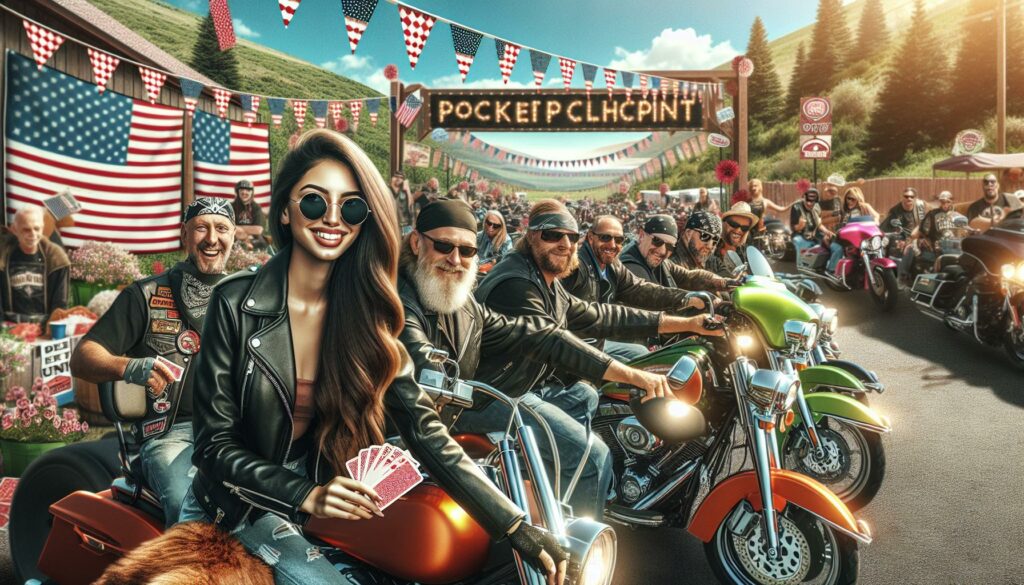If you’ve ever heard of a poker run and wondered what it’s all about, you’re in for a treat. These events blend the thrill of a scavenger hunt with the excitement of poker, creating a unique experience for participants. I’ve seen how poker runs bring people together, whether it’s on motorcycles, boats, or even in cars, all while raising money for a good cause. At its core, a poker run involves traveling to various checkpoints to collect playing cards. The goal? To create the best poker hand by the end of the run. It’s not just about luck; strategy and camaraderie play a big role. Join me as I dive deeper into the mechanics of poker runs and share tips on how to make the most of this exhilarating adventure.
- Definition and Structure: A poker run is a community event where participants travel to predefined checkpoints to collect playing cards, aiming to create the best poker hand.
- Registration and Fees: Participants register and pay an entry fee, which typically supports charitable causes, ranging from $10 to $50.
- Strategic Gameplay: The success in a poker run relies on both strategy in choosing stops and the luck of the cards drawn, with players forming a five-card hand at the end.
- Community and Charity Focus: These events foster community involvement and raise funds for local charities, enhancing social bonds among participants.
- Exploration and Engagement: Poker runs allow participants to explore local venues, creating opportunities for social interaction and discovering new places.
- Prizes and Recognition: Many poker runs award prizes to participants with the best poker hands, adding excitement and motivation to the event.
How Does a Poker Run Work
Poker runs involve a series of stops where participants collect playing cards at designated checkpoints. These checkpoints can be located at various venues, including bars, restaurants, or landmarks. After visiting all stops, participants form a poker hand using the cards they’ve collected. The goal is to create the best possible combination, enhancing competition among individuals or teams.
Participants typically register for the event and pay an entry fee, which often goes to a charitable organization. Each poker run usually features a set route that ensures an enjoyable journey, allowing for scenic drives or rides. Communication about the specific start and end points happens before the event.
I encourage players to strategize their stops for optimal card collection. Gathering cards in a methodical manner can improve chances of winning. Additionally, many poker runs include prizes for the best poker hands, further motivating participants. These events not only focus on the game but also cultivate a sense of community and camaraderie among participants, making for a memorable experience.
The Basics of Poker Runs
Poker runs combine strategic play with an adventurous journey, making them enjoyable community events. Participants collect playing cards from various checkpoints to form the best possible poker hand.
Definition of a Poker Run
A poker run is an organized event where participants travel to predetermined checkpoints to collect playing cards. Each participant registers and often pays an entry fee that contributes to a charitable cause. At each checkpoint, players receive one card to form a five-card poker hand. The person with the best hand at the end of the run wins a prize, typically related to the event’s purpose or sponsors.
Purpose and Goals
Poker runs aim to foster community spirit while raising funds for charity. Participants enjoy camaraderie and friendly competition as they travel together. Additionally, the event encourages exploration of local venues and highlights nearby attractions. Organizers often establish goals related to fundraising targets, community awareness, and social engagement, promoting positive interactions among diverse groups.
How a Poker Run Works
Poker runs operate through a structured yet enjoyable format, allowing participants to combine skill with social interaction. Here’s a closer look at the essential components of a poker run experience.
Registration Process
Participants must register for the poker run, typically done in advance or on-site. Registration involves filling out a form and paying an entry fee, which usually supports a charitable cause. Fees range from $10 to $50, depending on the event, and sometimes include a meal or a giveaway. Upon registration, each participant receives a unique identifier, often a wristband or card, to confirm their entry into the event.
Card Draw and Stops
Poker runs feature multiple stops, commonly ranging from five to ten locations. Each stop serves as a checkpoint where participants draw a playing card. Participants collect one card at each location, ultimately forming a five-card poker hand. Strategic planning is vital; players often consider the timing and order of stops to maximize their chances of drawing better cards.
Locations for stops tend to include bars, restaurants, or local landmarks, fostering community engagement and exploration. Each stop may also offer activities or promotions, enhancing the overall experience. At the end of the run, participants reveal their poker hands, and prizes are awarded for the best combinations, typically determined by standard poker rules.
Types of Poker Runs
Various types of poker runs cater to different interests and modes of transportation. Each type enhances the unique experience participants encounter while enjoying the thrill of the event.
Motor Vehicle Poker Runs
Motor vehicle poker runs include a wide array of vehicles, such as cars and trucks. Participants may navigate urban settings, scenic routes, or highways, collecting cards at designated stops. These events attract individuals and families, creating a welcoming atmosphere for all ages. Often, local businesses sponsor stops, promoting community engagement while providing refreshments and activities.
Motorcycle Poker Runs
Motorcycle poker runs cater to riding enthusiasts and offer a thrilling alternative for participants. Riders typically cruise along picturesque roads, forming a close-knit community during the ride. Safety is emphasized, with riders encouraged to follow traffic regulations and wear appropriate gear. Many events prioritize scenic routes, allowing participants to explore local attractions while collecting cards, fostering camaraderie among motorcycle aficionados.
Benefits of Participating in a Poker Run
Participating in a poker run offers numerous advantages beyond just the thrill of the game.
- Community Engagement: Poker runs promote community spirit by bringing together individuals with shared interests. I enjoy meeting fellow participants who are passionate about vehicles, whether they ride motorcycles, drive cars, or use boats.
- Support for Charitable Causes: Many poker runs benefit local charities. By joining an event, I contribute to a meaningful cause while having fun. Entry fees typically range from $10 to $50, and all funds collected aid organizations that serve the community.
- Social Interaction: Poker runs create opportunities for socializing. I connect with friends and make new ones throughout the event. The atmosphere encourages camaraderie, enhancing the overall experience.
- Exploration of Local Venues: Visiting different checkpoints allows me to explore local restaurants, bars, and landmarks. I discover new places I might not have otherwise visited, enriching my knowledge of the area.
- Excitement of the Game: The thrill of drawing cards at various stops keeps me engaged. I strategize my stops to maximize my chances of forming a strong poker hand, adding a competitive edge to the experience.
- Prizes and Recognition: Many poker runs offer prizes for the best poker hands. Competing for these rewards adds extra motivation. Cheering for winners fosters a sense of achievement and celebration among all participants.
- Health Benefits of Riding: If I participate in a motorcycle poker run, I get to enjoy health benefits associated with riding. Riding helps reduce stress and improves my overall well-being.
Participating in a poker run fosters a unique blend of fun, community, and charity, making it a rewarding experience for anyone involved.
Participating in a poker run is an exhilarating way to combine fun with community spirit. I love how these events bring people together while supporting charitable causes. The thrill of collecting cards at various stops adds an exciting twist to the experience.
Whether I’m riding my motorcycle or cruising in a car, the camaraderie and friendly competition make every poker run memorable. Plus, exploring local venues along the way is a fantastic bonus. If you haven’t tried a poker run yet, I highly recommend joining one. You’ll not only enjoy the adventure but also make a positive impact in your community.

